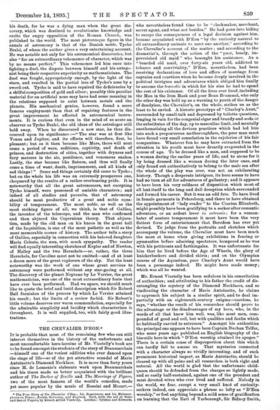GREAT ASTRONOMERS.*
THE study of astronomy, in spite of the fascination which it naturally exercises upon the mind of the youthful inquirer, is one from which the young will too often turn away in dismay, scared and disheartened by the initial difficulty of understanding the language of the astronomer. Sir Robert Ball, therefore, deserves no little thanks for his efforts to popularise the science and bring it within reach of the intel- ligence of children and unscientific people. The book before us, which deals with the lives of the greatest of astronomers from the time of Ptolemy to the present century, and indi- cates the main features of the discoveries which they successively made, contains, notwithstanding the somewhat abstruse character of its subject, nothing that is not easily within the comprehension of the intelligent child. The study of the stars, we need hardly say, did not begin with Ptolemy, but none of his great predecessors, with the excep- tion of Hipparchus, would quite enter the scheme of pro- gressive knowledge which the author so simply and ably describes. Of the actual life of Ptolemy little is known ; but the system which he based upon the ancient lore of his fore- runners and his own observation was destined to hold its own for nearly fourteen centuries. It is difficult to understand how the great Egyptian so narrowly missed the truth, or how his magnificent error held its own for so many hundreds of years, but the author fairly succeeds in finding an explana- tion in the extraordinary ingenuity of Ptolemy's theories and the argument by which they are supported. From Ptolemy to Copernicus is an immense leap in time, and yet it was not until the latter's death in 1543 that the world was really asked to consider a new celestial system. Till then, the earth was stationary, the centre round which all else revolved ; no dweller upon it could be persuaded to believe that he was racing through space; to Copernicus belonged the honour of discovering the real place of his own globe in the planetary system. Possibly, he was happy in the time of
• Great Astronomers. By Sir Robert B. Ball. London: labister and Co.
his death, for he was a dying man when the great dis- covery, which was destined to revolutionise knowledge and excite the angry opposition of the Roman Church, was published to the world. The most picturesque figure in the annals of astronomy is that of the Danish noble, Tycho Brahe, of whom the author gives a very entertaining account. He was notable not only for his astronomical discoveries, but also " for an extraordinary vehemence of character, which was by no means perfect." This vehemence led him once into fighting a duel, the dispute between himself and his antago- nist being their respective superiority as mathematicians. The duel was fought, appropriately enough, by the light of the stars, and resulted in the partial loss of Tycho's nose by a sword•cut. Tycho is said to have repaired the deficiencies by a skilful composition of gold and silver ; possibly this peculiar material for an artificial nose may have had some meaning in the relations supposed to exist between metals and the planets. His mechanical genius, however, found a more famous employment than that of repairing features in the great improvement he effected in astronomical instru- ments. It is curious that even in the mind of so acute an observer as Tycho Bra136, the old ideas of the astrologer still held sway. When he discovered a new star, he thus dis- coursed upon its significance :—" The star was at first like Venus and Jupiter, and its effects will therefore, first, be pleasant ; but as it then became like Mars, there will next come a period of wars, seditious, captivity, and death of princes, and destruction of cities, together with dryness and fiery meteors in the air, pestilence, and venomous snakes. Lastly, the star became like Saturn, and thus will finally come a time of want, death, imprisonment, and all kinds of sad things ! " Some sad things certainly did come to Tycho ; but on the whole his life was an extremely prosperous one, chequered by the results of a rather overbearing pride. It is noteworthy that all the great astronomers, not excepting Tycho himself, were possessed of amiable characters ; and indeed of all studies and pursuits, that of astronomy should be most productive of a great and noble equa- bility of temperament. The most noble, as well as the most striking figure of all, we think, is that of Galileo, the inventor of the telescope, and the man who confirmed and then abjured the Copernican theory. That abjura- tion, made by the old man on his knees in the great hall of the Inquisition, is one of the most pathetic as well as the most memorable scenes of history. The author tells a story of Galileo, especially in connection with his beloved daughter, Maria Celeste, the nun, with much sympathy. The reader will find equally interesting sketches of Kepler and of Newton, of Halley and the two Herschels—or, rather, the three Herschels, for Caroline must not be omitted—and of at least a dozen more of the great explorers of the sky. Not the least noteworthy was the work of one whose great services to astronomy were performed without any star-gazing at alL The discovery of the planet Neptune by Le Verrier, the great mathematician, was one of the most extraordinary feats that have ever been performed. Had we space, we should much like to quote the brief and lucid description which Sir Robert Ball furnishes of the process by which Le Verrier attained his result; but the limits of a review forbid. Sir Robert's little volume deserves our warm commendation, especially for the admirable simplicity and lucidity which characterises it throughout. It is well supplied, too, with fairly good illus- trations.











































 Previous page
Previous page